SUMMARY
This is AI generated summarization, which may have errors. For context, always refer to the full article.

Despite the fall of Marcos, the military continued to play powerful roles outside its traditional tasks. Generals have influenced key decisions of the civilian leadership; dominated critical posts in government; and brokered transitions from one regime to another. This involvement in public life has its roots in the colonial years and is determined by the nature of the regime and society that a military serves.
The political involvement of the Philippine military has transformed over the last four decades, depending on the nature of the regime.
Under Marcos, the AFP was an active partner of the civilian administration.
Under Cory Aquino, an armed forces faction tried – for at least six times – to seek power through violent means.
In 1992, a general tried another tack – which proved to be effective – of seeking power through the ballot. HIs victory opened the floodgates to military appointees in the bureaucracy long after his term.
Over the years, the role of the military outside its assigned tasks has concentrated on:
- influencing key decisions of the civilian leadership
- dominating critical posts in government
- playing the role of power broker from one regime to another, as what happened in 1986 and 2001
These roles debunk and defy some scholars’ insistence on the neutrality of the armed forces. Military scholar Samuel Huntington, for example, stresses the possibility that an apolitical, neutral armed forces exists, composed of a professional corps of soldiers.
But a study on the extent of civilian control over the Philippine military from 1946 to 1976, UP Professor Hernandez says that the role of the military in government has expanded from influence to participation, especially after Marcos’ declaration of Martial Law in 1972.
Political scientist Miranda goes further back, pointing out that the politicization of the Philippine armed forces started even long before Marcos declared Martial Law – after World War II, when Third World countries went through transition periods that saw their militaries involved in managing state affairs.
This paper takes the similar view that the military is a product of its own environment, and even a reflection of it.
Alfred McCoy’s arguments (1999) have been helpful in this regard. According to him, the Philippine military is not insulated from its political environment, but that two contextual forces determine the role it plays in that environment:
- the socialization of the Filipino officer corps
- the nature of the regime that presides over the military in specific political periods
Military neighbors
The Philippine military defies easy categorization. It is historically a non-interventionist military, especially when compared to its neighbors like Indonesia, Thailand, Burma, Cambodia, and Vietnam.
As it stands now, the Philippines and Indonesia share a similar experience in having military officers in the civilian bureaucracy. Retired military officers, too, had been elected to Indonesia’s parliament.
Thailand, after a period of democracy, is back under military rule.
Unlike Thailand and Indonesia, however, the Philippines, Malaysia, and Singapore, have not experienced the violent takeover of government by the military.
For three decades since the 1960s, the Indonesian military somehow stabilized from its adventurous streak. But before that, it bore witness to coups and counter-coups by its warring Army factions.
A key factor in understanding civil-military relations in the region is the nature of the countries’ struggle for independence. Where the nationalist struggle was gradual, civilian supremacy prevailed, like in Singapore and Malaysia. The military’s role in Indonesia, Vietnam, and Burma was more dominant because the nationalist struggle in these countries had been more violent.
The Indonesian armed forces, for example, enjoyed a martial tradition through their role in driving away the Dutch colonial powers. The Indonesian military eventually imbibed the value of its role in shaping Indonesia’s future.
On the other hand, the AFP was created by and after the image of a colonial master, the United States, which pushed for the ideal of an apolitical professional officer corps. Ironically, it was the US that exposed the AFP to its own contradictions. Because while the US indoctrinated the AFP on the values of a professional Army, it also exposed the military to another form of political intervention.
American influence
It was the US, particularly under the presidency of Ramon Magsaysay in the 1950s that encouraged the expansion of the military’s role in society to include civic-development actions. These inevitably exposed Filipino soldiers to governance issues, an exposure further reinforced when Marcos declared Martial Law in 1972 and assigned the soldiers to non-combat jobs such as collecting garbage.
During the Marcos period, the military’s expanded work gave it legitimacy that was quite distinct from the State’s. What added to that legitimacy was the AFP’s role in crushing the twin rebellions that grew under subsequent regimes – the Marcos regime in particular: a communist insurgency and a secessionist movement by Muslims in the south.
Soldier’s socialization
Apart from the nature of the regime, following McCoy’s framework, the other factor that has helped shape the military’s role in society and the civilian bureaucracy is the Filipino soldiers’ socialization.
In the aftermath of the 1991 earthquake, the worst to hit the Philippines, practically all military units were deployed as disaster rescue teams. This was understandable: the military had the best equipment, had the widest reach, and was the most mobile organization in times like this.
A town badly hit by the quake, Kayapa, Nueva Vizcaya, had a strange experience. Its mayor got so disoriented that he could not perform the task of organizing rescue efforts for his constituents. This prompted the Army division commander in Northern Luzon to appoint a “military mayor” – an Army colonel – for the duration of the rescue effort, sidelining the incompetent mayor. Kayapa residents welcomed the move; the mayor was defeated in the elections that followed.
To this day, in faraway places, the military is the government. Army camps provide electricity and water to neighboring villages, distribute medicines to families, rescue them from typhoons and other disasters.
Any military officer will be proud to say that he is an asset to the civilian bureaucracy on two counts: the experience he has in the field and the discipline he learned from his regimented training at the PMA.
It is only in the AFP officer corps where one finds a big percentage of mid-level officers with a masters degree, which makes them potential recruits for management jobs in the civilian bureaucracy as well as big business.
When a soldier becomes a captain (a captain’s age ranges from mid-20s to early 30s), he will oblige himself to take up advanced schooling for his promotion. While he goes to a military school, the curriculum teaches him basic management courses. Even then, the captain shall have already learned management skills in the field. As company commander, for example, he supervises 150 men, manages their budget, and deploys other resources and equipment for their use.
Many officers, too, look beyond military schools for their advanced training. The favorite school is the prestigious Asian Institute of Management (AIM).
From 1971 to 2001, a total of 180 PMA graduates finished (or were finishing in the case of Batch 2001) management courses at AIM. Six of the AIM graduates plotted coup attempts against the Aquino government. They were the following:
- Captain Jose Comendador (AIM, 1973, Masters in Business Management)
- Lieutenant Colonel Edgardo Abenina (AIM, 1975, Masters in Management)
- Lieutenant Colonel Victor Batac (AIM, 1980, Masters in Business Management)
- Lieutenant Colonel Gregorio Honasan (AIM, 1981, Masters in Business Management)
- Lieutenant Colonel Eduardo Kapunan Jr (AIM, 1982, Masters in Management)
- Navy Lieutenant Proceso Maligalig (AIM, 1982, Masters in Management)
Subordinate to civilians
Civilian authority has always been impressed on the Filipino soldier in and out of the academy where he spends his first four years as a cadet. This obedience to civilian authority is compelled by the fact that under the Constitution, the president, a civilian, is the commander-in-chief of the armed forces.
Since the rebirth of democracy in 1986, for example, soldiers with the rank of colonel upwards have had to pass through the bicameral Commission on Appointments, composed of elected senators and representatives, for the final approval of their promotion.
In remote villages where government presence is almost nil, the Filipino soldier acts as government representative. Yet he finds it his duty to pay a courtesy call on the congressman of the area where he is assigned and even attends his parties. The soldier knows fully well that he has to be in the good graces of the local politician if he wants to stay long in his command.
Thus, the Filipino soldier’s socialization over the years, as McCoy puts it, has impressed on him his subordination to civilian authority.
One exception would be the series of rebellions staged by soldiers under the Aquino administration. McCoy attributes this largely to the kind of regime that the plotters had served previously, and which shaped their political consciousness. The mutinous soldiers belonged to military classes that were deployed by the Marcos regime to combat communism and secessionism, and in the process saw for themselves the corruption of his regime.
This brings us to McCoy’s second factor that helps determine how the soldier views his role in government and society, apart from his socialization: the character of the regime that he serves and that presides over the key campaigns of the military.
That regime may utilize the armed power of the military to sustain its hold on society (Marcos regime), or it could be so fearful of it so that it comes up with ways to accommodate the armed forces in the power corridors (Ramos, Arroyo and Duterte regimes).
Either way affects the soldier and his views about society and his role in it.
It can be argued, however, that the successive failed coups launched by rebel soldiers after 1986 have determined to a large extent how future regimes treated the Filipino soldier and his institution. These failed coups, on the other hand, prompted the politicized soldier to rethink his role in society, and how best to achieve that with the least damage.
Below are links to the stories that are part of this series:
Add a comment
How does this make you feel?
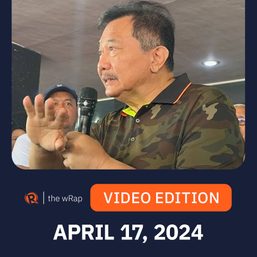
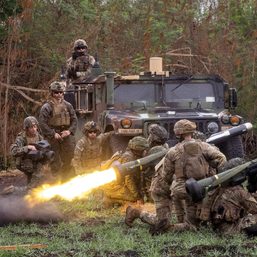
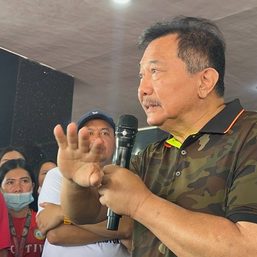
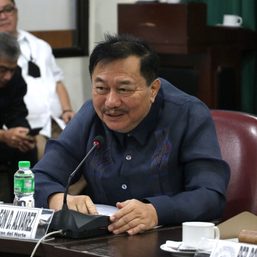
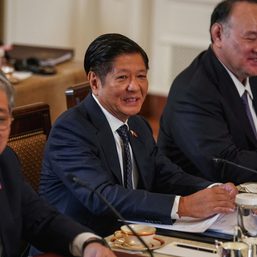
There are no comments yet. Add your comment to start the conversation.